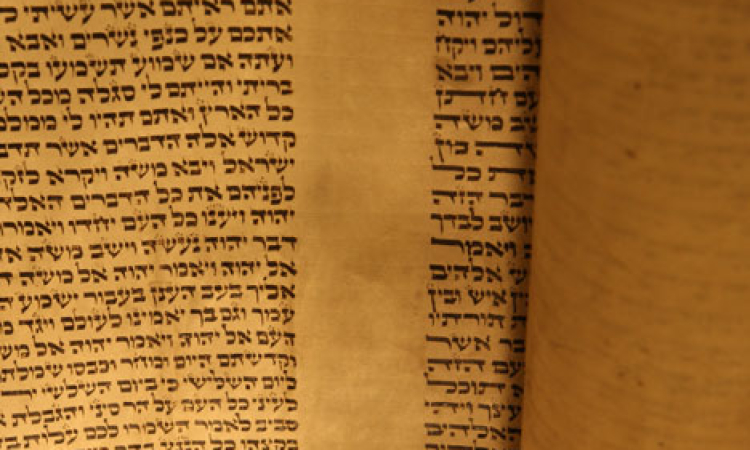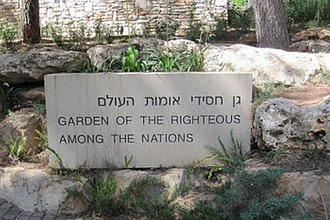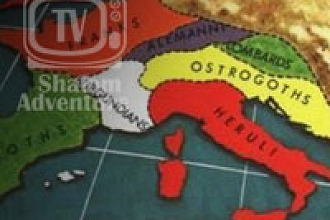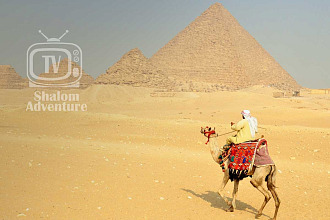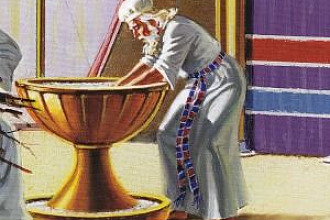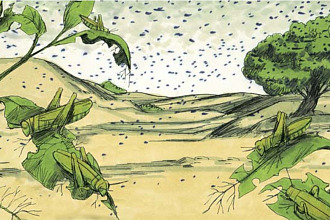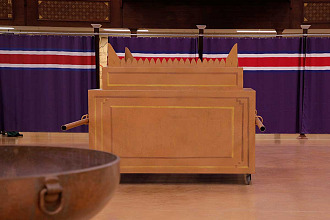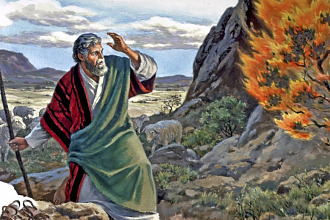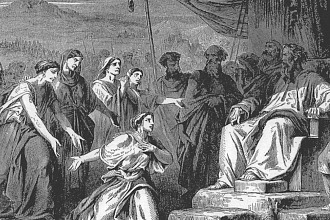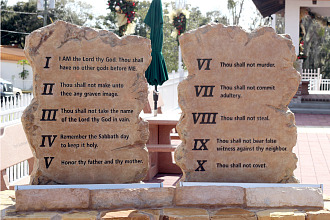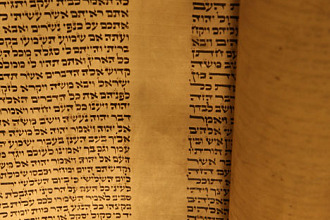Parasha for the Week: Devarim Deuteronomy 1:1 – 3:22
Haftara for the Week: Isaiah 1:1 – 27
Besorat Yeshua: Mark 6:28 - 40
Overview
This Parasha begins the last of the Five Books of The Torah, Sefer Devarim. This Book is also called Mishneh Torah, “Repetition of the Torah” (hence the Greek/English title Deuteronomy). Sefer Devarim relates what Moshe told Bnei Israel during the last five weeks of his life, as they prepared to cross the Jordan into Eretz Israel.
Moshe reviews the mitzvot, stressing the change of lifestyle they are about to undergo: from the miraculous existence of the desert under Moshes guidance to the apparently natural life they will experience under Yehoshuas leadership.
The central theme this week is the sin of the spies, the meraglim. The Parasha opens with Moshe alluding to the sins of the previous generation who died in the desert. He describes what would have happened if they had not sinned by sending spies into Eretz Israel.
Hashem would have given them without a fight all the land from the Mediterranean to the Euphrates, including the lands of Ammon, Moav and Edom. He details the subtle sins that culminate in the sin of the spies, and reviews at length this incident and its results. The entire generation would die in the desert; Moshe would not enter Eretz Israel. He reminds them that their immediate reaction to Hashems decree was to want to “go up and fight” to redress the sin. He recounts how they would not listen when he told them not to go, that they no longer merited vanquishing their enemies miraculously. They ignored him and suffered a massive defeat. They were not allowed to fight with the kingdoms of Esav, Moav or Ammon these lands were not to be part of the map of Eretz Israel in the meantime. When the conquest of Canaan will begin with Sichon and Og, it will be via natural warfare.
“Tisha B’Av”
Tisha B’Av (July 30, 2009) is observed to mourn the loss of the Temples in Jerusalem. The Temple was a place of prayer, spirituality, holiness, open miracles. It was the focal point for the Jewish people, the focal point of our Jewish identity. Three times a year (Passover, Shavuot, Sukkot) every Jew would ascend to the Temple. Its presence pervaded every aspect of Jewish life - planning the year, where one faced while praying, where one would go for justice or to learn Torah, where one would bring certain tithes.
On this same day throughout history many tragedies befell the Jewish people, including:
1. The destruction of the first Temple in Jerusalem by Nevuchadnetzar, King of Babylon.
2. The destruction of the Second Temple in Jerusalem by the Romans in 70 CE.
3. The Jews of England expelled in 1290.
4. Pope Urban II declared the First Crusade. Tens of thousands of Jews were killed, and many Jewish communities obliterated.
5. The Jews of Spain were expelled in 1492.
Tisha B’Av is a fast day (like Yom Kippur, from sunset one evening until the stars come out the next evening) Like all fast days, the object is introspection, making a spiritual accounting and correcting our ways -what in Hebrew is called, teshuva, returning, to the path of good and righteousness—to the ways of the Torah.
Teshuva is a five part process:
(1) We must recognize what we have done wrong and regret it.
(2) We must verbally ask the Almighty to forgive us.
(3) We must accept the forgiveness offered by G-d through the merits of the Mashiach.
(4) We must correct whatever damage that we can.
(5) We must accept God’s Spirit to empower us not to do it again.
On the night of Tisha B’Av we read in the synagogue Eicha, the book of Lamentations, written by the prophet Yirmiyahu (Jeremiah)
“Moses a Man of Words”
The Midrash asks, “How is it that here the Torah says, “These are the words that Moshe spoke,” yet, in the Book of Exodus, when G-d tells Moshe to go speak to Pharaoh and to the Jewish people in Egypt, Moshe replies, “Oh G-d, I am not a man of words...” Moshe claims that he cannot speak! “Rabbi Tanchuma said, This is compared to a peddler who was going around selling material calling out, ‘I have special wool to sell.’” When he passed by the palace. The king called him over and asked him, “What are you selling?” The peddler replied, “I have nothing to sell.” “But I just heard you announce that you have special wool to sell,” asked the king. Said the peddler to the king: “It is true that I announced I have good wool to sell. But this is for the ordinary person. For you, my king, who is so mighty and who has the most expensive materials that can be found, for you I have nothing to sell and nothing that you would buy!” The same was with Moshe. In the presence of G-d, who created a person’s mouth, Moshe claimed that he was not a man of words. But now in front of the Jewish people, he was indeed a man of words. Thus, the Torah says, “These are the words which Moshe spoke to all of Israel.”
HAFTARA Isaiah 1:1 – 27
This Shabbat, the Shabbat before the fast of Tisha B’Av, is called Shabbat “Chazon,” because the Haftorah of this Shabbat begins with the word “Chazon.”
Haftara: The Haftara continue to give the reasons of the destruction of Jerusalem. “I reared children and brought them up, but they have rebelled against me. The ox knows its owner, and the donkey its master’s crib; but Israel does not know, my people do not understand” (Isaiah 1:3). The L-rd is so upset with Israel that he call her Gomorrah “Listen to the teaching of our God, you people of Gomorrah!” (10) The Almighty said to Israel that he did not like their sacrifices “What to me is the multitude of your sacrifices? says the L-RD; I have had enough of burnt offerings of rams and the fat of fed beasts; I do not delight in the blood of bulls, or of lambs, or of goats” (11). If the L-rd does not like anymore Israel’ sacrifice, it is not because G-d is against sacrifices but just because Israel’s ceremonies have lost their significance for Israel and became just rituals. That’s why the Lord does not like not only sacrifice but also Sabbath and feasts “bringing offerings is futile; incense is an abomination to me. New moon and sabbath and calling of convocation—I cannot endure solemn assemblies with iniquity. Your new moons and your appointed festivals my soul hates;” (13- 14). The L-rd never loses hope, his people is still his people, “Wash yourselves; make yourselves clean; remove the evil of your doings from before my eyes; cease to do evil, ” (16). It is a call to repentance “Come now” (18). The Lord is a God full of forgiveness and love for his people “though your sins are like scarlet, they shall be like snow; though they are red like crimson, they shall become like wool. If you are willing and obedient, you shall eat the good of the land” (19-20). Whatever Israel done in the past, G-d is willing to forgive. However, if the people don’t want to repent and to ask forgiveness, the L-rd will not be able to bless them and they will fall. The text ends with a positive statement, “I will restore your judges as at the first, and your counselors as at the beginning. Afterward you shall be called the city of righteousness, the faithful city. Zion shall be redeemed by justice, and those in her who repent, by righteousness” (26-27).
Besorat Yeshua Mark 6:28 – 40
The parasha Devarim is a synopsis of what took place during the 40 years in the desert. Moshe has compassion on Israel and repeats the law of God for the second time.
Besorah: The disciples were tired, they worked very hard with Yeshua but they also were full of enthusiasm “The apostles gathered around Y’shua, and told him all that they had done and taught” (Mark 6:30). Yeshua saw that they were tired and decided to send them in a quiet place to take some rest “Come away to a deserted place all by yourselves and rest a while” (31). However the crowds followed them and Yeshua had compassion for these people. They were under the rule of a very rude king— who just killed John the Immerser— and without spiritual shepherd “he saw a great crowd; and he had compassion for them, because they were like sheep without a shepherd (34). Yeshua taught the crowds, many hours, the sun was already down, the disciples were afraid that these people would not find any food, and they said to Yeshua “This is a deserted place, and the hour is now very late; send them away so that they may go into the surrounding country and villages and buy something for themselves to eat” (35-36). Yeshua gives them a very strange order “You give them something to eat” (37a). How could it be possible for the disciples to give food to five thousand people? “Are we to go and buy two hundred denarii worth of bread, and give it to them to eat?” (37b) The disciples are ready to take all the responsibility, even though they don’t know how to do it. However Yeshua will show them that it is impossible to do this task without help from above. Yeshua ask a simple question “How many loaves have you? Go and see.” When they had found out, they said, “Five, and two fish” (38). They had only five leaves and two fish, that is nothing to feed five thousand people. But Yeshua did the miracle and they were able to feed all the people. This miracle was possible because the disciples were obedient. Are we obedient in order to let Yeshua to perform miracles in our life?

